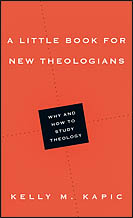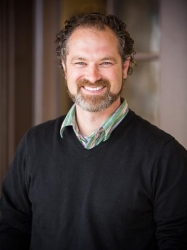Dr. Kelly M. Kapic (Ph.D. King’s College, University of London) is professor of theological studies at Covenant College in Lookout Mountain, Georgia. He is the author of God So Loved, He Gave and Communion with God, as well as co-editor of several works, including The Devoted Life and Mapping Modern Theology and his new A Little Book for New Theologians (IVP, 2012).
Doing theology is serious business — joyful indeed, but very serious. Although it is certainly an intellectual endeavor, it is much more than that. And the best of theologians have always been carefully aware that in this work there is always an interplay of reason with worship, faith, prayer, piety, affections, submission, obedience, and so much more. Augustine and other of the ancient fathers, Luther, Calvin, Owen, Edwards, Hodge, Warfield, and many others have made a point to stress this fuller dimension of theological pursuit. Warfield’s famous 1911 The Religious Life of Theological Students comes to mind, as well as Helmut Thielicke’s 1959 A Little Exercise for Young Theologians. Before these were Conrad von Orelli’s “Preparation for the Sacred Ministry: An Old-World View,” and of course Herman Witsius’s On the Character of a True Theologian. Some newer works have addressed the subject also, such as The Pastor as Scholar and the Scholar as Pastor: Reflections on Life and Ministry by D.A. Carson and John Piper (David Mathis, ed.), and John Piper’s Think. And Andrew Cameron and Brian Rosner bring together sage counsel from theologians past and present in their Trials of Theology: Becoming a Proven Worker in a Dangerous Business.
It is in this vein that Dr. Kelly Kapic offers his very helpful contribution, A Little Book for New Theologians. In a way this is theological prolegomena at its very importantly basic level, as the subtitle implies — Why and How to Study Theology. Reading through it we were struck both with the continual need for such a work and the value of this little book. We might only object to the title a bit — this counsel serves very well as a “first” textbook for theological students, but it is useful for old theologians too! We give it very high marks and hearty endorsement.
So we contacted Dr. Kapic, and he has generously taken the time to answer some questions and walk us through some of the main points his book. Below is the first installment of this interview.
Books At a Glance (Fred Zaspel):
Our first question is very basic: Who “does theology”? You make a point to say that everyone does theology, not just the professional theologian and the preacher. It is likely that this assertion makes some scratch their heads — certainly there are many people who at least don’t think they do theology! Please explain.
Kelly Kapic:
At its most basic level, theology is simply a word (logos) about God (theos). And our ‘words’ about God do not need to be spoken – often they are found in the unspoken groans of our hearts or the questions that plague our minds, but we never verbalize them to anyone. The truth is that our understanding about God – our theology – deeply shapes our lives, whether we know it or not. Whether one struggles with a child’s learning disability, infertility, or with feelings of personal isolation, we are ultimately struggling with deeper theological issues. If you imagine God to be furious all the time, this impacts how you live, spend your time, etc. If you instinctively assume that God is absent and unconcerned, your life and emotions will reflect this belief. In countless ways, our theology shapes us. Consequently, as is sometimes said, the question is not, Are you a theologian?, but Are you a good one?
Books At a Glance:
Okay then, in what ways should theology be important to the Christian, even the Christian “layman”?
Kelly Kapic:
As Christians, all of us need to be concerned that our praise, prayers, and worship of God are directed to the God who is, rather than a self-created idol. As Calvin memorably said, our hearts are idol factories, and thus we can easily end up with deeply problematic views of God that pervert our worship, cause us to live misshapen lives, and stunt our ability to flourish under God’s grace and holiness. We all should desire to worship God faithfully, not just the professional theologians or pastors.
Because all Christians care about worshiping the true God, we all inevitably must care about theology, even if we never plan to read academic theological books. When I speak of theology in this way, let us not get confused and reduce it to scholarly reflections. You can be a very good theologian even if you never graduate from high school. True theology is about knowing and loving God, who has revealed himself through his Son and Spirit, who has given us his written Word, and who is present with us in our lives. One can learn rich and life-giving theology without reading books. Be with God’s people, soak yourself in God’s word, participate in and understand the sacraments, and grow under the preaching and living of God’s word that happens among God’s people – this can provide a path to being a ‘good theologian,’ even if you never read a word that Augustine or John Calvin wrote… although reading such guides could be a great encouragement along the way.

Books At a Glance:
What is the primary danger, or pitfall, you are warning against in this book?
Kelly Kapic:
Actually, there are various dangers I have in mind throughout the book. I learned a long time ago from the Puritan John Owen, that whenever one gets concerned about one danger, you should also pause to consider the other possible hazard that may go unnoticed. So, for example, when wrestling through how to understand the person and work of the Holy Spirit, Owen always kept before him two potential threats: rationalism on the one hand, and ‘enthusiasm’ on the other. Too often we only focus on one danger, the one we fear most, and as a result we fail to see how we ourselves may be tempted to fall into the opposite problem.
So, in this book, I warn against various dangers. On the one hand, Scripture highlights for us that concern for the poor is crucial to rightly ‘knowing’ God, yet on the other hand we cannot let our theology become co-opted by a particular political party or agenda. On the one hand we should be wary of uninformed emotionalism, while on the other hand we should also avoid dry rationalism. We should avoid pitting piety against action, or prayer against study, or tradition against contemporary relevance. These and other dangers were consistently on my mind throughout the writing of this book.
Books At a Glance:
What steps can we take to avoid this mistake?
Kelly Kapic:
Each potential danger has its own needed remedy. For example, our temptation to individualistic theology can only be remedied as we begin to actively participate and submit ourselves to the local body of Christ. Such isolating individualism is also checked by learning to value tradition, which points beyond our own time and place to the larger and broader story of God’s presence and work among his people.
Or consider the temptation to reduce scripture to a theological textbook, rather than the living word of God. In such cases, maybe we need to be slowed way down, called to meditate upon it in small bits, letting it have its way with us, rather than us constantly looking to it for our own purposes (e.g., sermon illustrations or proof texts). Or maybe we need the opposite: set aside fewer but much longer periods of time to read the scriptures. In this way you might begin to see again the larger narratives of the story of God’s faithfulness. Accordingly, rather than looking to the bible for abstracted axioms, we instead begin to enter the biblical drama of redemption —it becomes the truest story that reshapes us and illumines our world.
You see, each danger and its answer often depend on the person, their particular experience, and what they are struggling with. This is why no simplistic formulas will do. No, we each need careful pastoral wisdom and grace spoken into our lives by those who love God and us. And such voices certainly do not only come from pastors (you don’t need to be ordained to be pastoral to a fellow saint!). Such trusted friends can see the need and point us to the remedy. Understandably, this also affirms the importance of friends who have good ‘theology’ so that they might help us in our pilgrimage.
Books At a Glance:
How are concepts such as the knowledge of God, the fear of God, worship, and the enjoyment of God related?
Kelly Kapic:
The more I have studied and considered the ‘fear of the Lord,’ the more I have become convinced it is an important idea, but also strangely misunderstood. We instinctively know this seems like a strange idea – that somehow “fearing” God is the beginning of knowledge. Does this mean that being scared of God is the way we can finally start to learn? I don’t think that is quite right.
No, the fear of the Lord is about worship, it is about recognizing we are creatures and not the Creator. The fear of the Lord is about coming to terms with our finitude, and thus becoming humble, open, and attentive. From this posture not only can we begin to grow in knowledge, but also in enjoyment of God.
As a college professor, I can tell you that very little education happens with arrogant people – you don’t learn when you already think you know all the answers. Educators will tell you there is something called ‘cognitive dissonance,’ in which a person enters the uncomfortable spot of realizing that there is conflict between their various beliefs or understanding. Things are not lining up. What previously appeared clean and complete now looks messy and filled with holes. Once a student enters into ‘cognitive dissonance’ they are now in a position to learn. None of us like to live with such dissonance, so we seek to become informed. With such experiences comes the joy of discovery and cognitive rest.
I believe the fear of the Lord is like our entering into cognitive dissonance. We come before the holy, majestic, glorious Triune God, and before him we embrace our finitude, we confess our sin, we recognize our needs. It seems to me that true theological ‘knowledge’ can only begin from this posture. More could be said on this, but that will need to wait until I have time to expand these ideas in a proper essay, but I hope this idea makes some sense.
Editor: Check out the rest of our interview with Dr. Kapic as it continues here and here.
Buy the books

A LITTLE BOOK FOR NEW THEOLOGIANS
